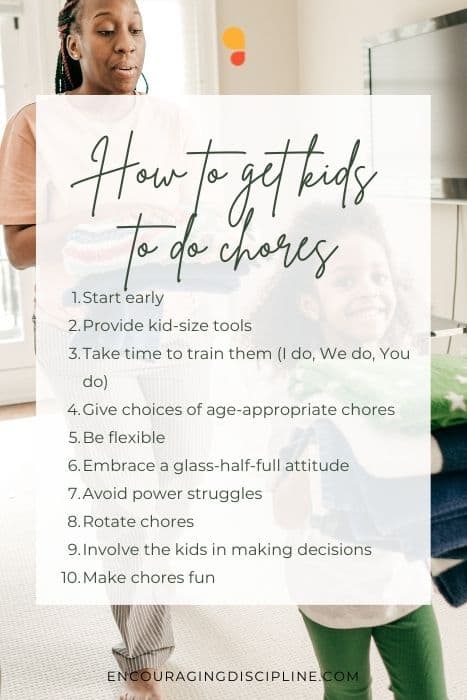Should We Pay Kids for Doing Chores?
Once kids reach school age, many parents begin thinking about two things that they would like their kids to learn to prepare them for life: managing money and becoming a meaningful contributor to the household. And, for the sake of efficiency, they may consider filling two needs with one deed and combining the two: we can pay kids for doing chores. We’re all strapped for time and energy, and this may seem like a good idea.
However, from a Positive Discipline perspective, which considers the long-term purpose of parenting, this approach causes more harm than good.
Table of Contents
To better understand long-term and short-term goals and to decide how to move forward, I thought of making two lists of goals and looking at how they work together.
What Do We Want Kids to Learn From Getting Paid?
The ideas behind giving kids money are that we want our kids to:
- Learn the value of money
- Manage their own finances
- Learn to save money
- Be able to buy their own wants (toys, treats, etc.)
- Develop an entrepreneurial mindset
- Become more confident
- Be financially independent in the future
I’m sure you could add more to this list. And all these reasons are very valid and they absolutely should be part of our parenting goals.
What Do We Want Kids to Learn From Doing Chores?
Now let’s list the things that we want our children to learn from doing household chores. We want our kids to:
- Understand that they are valuable and needed members of the family
- Learn that living together means everybody pitches in
- Develop intrinsic motivation, to want to help
- Keep commitments and follow through
- Know how to clean up after themselves
- Be able to organize their things (toys in the beginning)
- Appreciate living in a clean, organized, and neat space
- Appreciate the value of work itself.
Of course, there are other reasons why we want children to contribute to family chores.
Now if we try to juxtapose the two lists, we see that there isn’t much overlap. While both have valuable goals, they pretty much go parallel. There is no way to combine the two lists of purposes in a way that makes sense. And this is a very good indicator that the two issues should be treated separately.
In this blog post, I’ll explain how we undermine our good intentions when we pay kids for doing chores.
Why Is It Detrimental to Pay Kids for Doing Chores?
If the previous exercise wasn’t enough to convince you not to pay your kids for doing chores, let me briefly explain the downsides.
Rewards Undermine Intrinsic Motivation
There is plenty of research that shows the negative effects of using a reward system for something children already enjoy doing.
One of the more recent studies looks precisely at monetary rewards and their detrimental effect on intrinsic motivation.
When kids are little, up to the age of 3 or so, they are so eager to help us! Everything that we do is new to them and learning to do what the adults are doing is cool and tempting. We seem so able and skillful! Our kids want to be the same. So they want to help to put the laundry in the washer, set the table, wash the windows, mix the ingredients for the cookie dough, and so forth.
When kids are intrinsically motivated, their reward comes from the satisfaction of having learned a new skill or accomplishing a task. At that moment, their brain produces dopamine, a feel-good hormone that motivates learning and behavior.
When we begin rewarding kids for something they are intrinsically driven to do, in our case we pay them for doing chores, we actually interfere with their natural reward system. So by giving them an external reward, we hijack the natural process that happens in our kids’ brains.
When We Pay Kids for Doing Chores, the Effect is One-Sided
When we think about the two lists we made before, we saw that there is no overlap. The problem when we combine the two activities together is that the goals of one overpower the goals of the other.
In our case, there is a great chance that the pleasure of being rewarded with money will eclipse the lessons our children could learn from contributing to the family.
The way I explain it is that one offers an immediate reward – it is instantly satisfying to receive a sum of money. While for the other, the reward would come much later. The satisfaction from becoming skilled at something and seeing the value in contribution happens years after children have started doing chores.
We Either Pay Kids for Doing Chores or Punish
Let’s say children are not in the mood to do chores one day. So what do we do then? Do we use money as a means to punish or coerce them? The first thing that we say is, “If you don’t do (whatever chore), I’m not giving you the money.” You know that’s tempting. But it’s not really aligned with the Positive Discipline principles we are trying to follow here.
Parenting peacefully and respectfully means we are trying to stay away from nagging, coercing, threatening, and punishing. Instead, we focus on teaching and learning for life.
When Are Children Old Enough to Help With Chores?
It’s never too early to start involving kids in daily household chores.
I am sure you’ve noticed how interested young children are in learning how to do things, wanting to contribute and participate in everything we do. There are two things that I’d like to say about this.
One is that we often make the mistake of not letting our kids do any “serious” work. We either tell them, “You’re too little for this. Go play.” Or we may be impatient. Kids are messy and can’t do things as well as we do, so it’s easier and faster to do everything ourselves.
But by dismissing children in this way, we don’t actually help them develop any skills. They may never be able to successfully fold laundry if they don’t get to practice it over and over again.
So one reason why kids lose interest in helping around the house is that we don’t let them participate.
That being said, if we do involve them from day one, it’s still not a guarantee that their interest will be sustained. It is very common for kids to lose interest in chores around the age of 4. So it is helpful to keep this in mind and think of it as a phase or a milestone. Children’s development is not linear and there are always periods of ups and downs.
Related: How I Get My Kids to Clean Up Consistently
How to Get Kids to Do Chores Without Paying Them
I think it’s very clear that we all want our kids to help around the house and to learn how to take care of themselves eventually. So here are some tips that will help you create a culture of contribution in your family.

1. Start teaching them early
As I mentioned before, when kids show interest in helping out, don’t shut them down. Breathe, slow down, and use that moment to show your child they are important, useful, and needed members of the family. Spend time showing your child how to help, and give them a chance to practice with you.
2. Provide kid-size tools
Having kid-size and safe tools around the house makes it more fun and more likely that kids will be able to help successfully. I have a small-size citrus juicer, a small pizza cutter, small silicone mats, kid-size knives, gardening tools, and other items. My kids love working with them and it is understood in our family that no one else besides them is allowed to, say, cut the pizza, to give you an example.
If you’d like to see some ideas for kid-size tools, take a look at the Real-Life Play With Kid-Size Tools page on my website.
Related: Real-Life Play With Kid-Size Tools
3. Take time to train them
When I was teaching, I used a process called I do, We do, You do. And the way it works is this:
I do: First, I show my child how to do something, going through all the steps.
We do: Then, we do it together. We work side by side and help each other.
You do: When the child feels ready to do the job alone, I step back and watch. I let my child know I am available to help if needed.
The trick here is to not jump in to help unless asked!
4. Give choices of age-appropriate jobs
Here I would like to remind you to work together with your child if they are very young and to remember that, the younger kids are, the more practice they need before they’re able to complete a task independently.
At the same time, younger children don’t have the competency to do chores perfectly, so we need to be flexible and accept whatever they can do at their age.
Keeping our expectations realistic will save us a lot of unnecessary frustration.
For a downloadable list of age-appropriate chores, you can get access to the Printable Library.
5. Be flexible
If children get bored of doing the same chores, switch them around. If they don’t feel like doing them right now, give them options: “I’m ok with you taking a break now, as long as you finish emptying the dishwasher by 1 o’clock.”
We’re not rigid with ourselves and we shouldn’t be that way with our children either. Instead, we can teach them that our commitments are important and we stick to them. But we can also take care of ourselves and show a little flexibility when we need it.
6. Focus on the positives
Sometimes young children lose interest halfway through doing a job. And oftentimes they don’t do as good of a job as we could. Instead of nagging and complaining about what didn’t get done, notice what they already completed or the progress they made.
Focusing on the glass-half-full encourages children to keep working and getting better at doing chores.
7. Avoid power struggles
Nagging will just make you more and more frustrated. It is not respectful and it is not healthy for you either.
Similarly, criticizing or punishing children for not doing their chores only demotivates them and makes them resent the work.
It is normal for children to forget or avoid doing chores. And it is also natural for accidents to happen when children learn to do adult jobs.
Instead of getting into a power struggle, bring up the problem at a time when everyone is calm, and figure out a solution together.
8. Rotate jobs
There are many ways to rotate jobs and kids can be great contributors here.
Here are some ideas:
- Create a job spin wheel
- Let children choose two chores from a list of age-appropriate jobs
- Put jobs on slips of paper inside a jar or empty tissue box and have everyone pull out two jobs
- Make a chart with jobs along the top and names along the side and put checkmarks to show who’s doing which job
- Paste pictures of jobs on a long piece of cardboard and move clothes pins with everyone’s names along the side
As a teacher, I found that rotating jobs weekly worked best for my students. My kids are different and they like to stick to their jobs for much longer periods of time. So I suggest you be flexible and discuss options with your child to see what suits them best.
9. Involve the kids
Brainstorm together with the kids a list of jobs that need to be done. Invite children to notice and add to the list for a few days until you get a pretty solid list.
Then, together you can decide how to do those jobs. Oftentimes kids are very creative and resourceful and can come up with a system that we didn’t even think of.
It can be very empowering and motivating for kids to assign jobs to the adults in the family or to help decide which days or times of day should be allocated to doing chores.
When children are involved in the decision-making process, they are more likely to participate in actually doing the jobs.
10. Make chores fun
Chores are no fun when they’re handed out to you and you have to do them while others are watching TV. My advice would be to have a “chore time”, “clean-up time”, or whatever else you want to call it when everybody in the house works together. You could even play some music while you all work. Or you could sing or tell jokes.
Even though we call it a “chore”, it shouldn’t “feel like a chore”.
Final Thoughts
We want our kids to be helpful and willing to contribute. We hope that, by doing chores, they will develop character and values. When we make contributions a family value and expectation, our children know that they are valuable members of the family and they have the satisfaction of seeing the results of one’s work and contribution.
But unfortunately, when we pay kids for doing chores, and we introduce money into the equation, this becomes a transaction. I do something for you if there’s something in it for me. And instead of the gain being of emotional value, it becomes materialistic.
Learning about money certainly has its place in our parenting responsibility to our children. But not in the same boat as learning to contribute out of the goodness of one’s heart.







